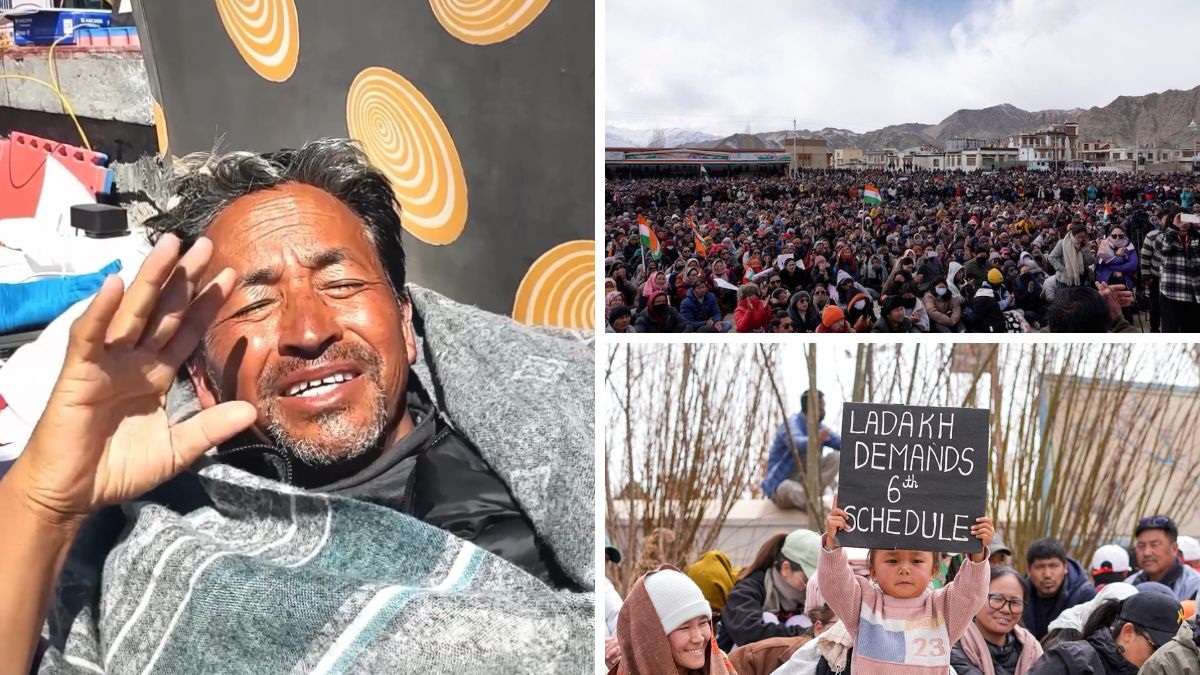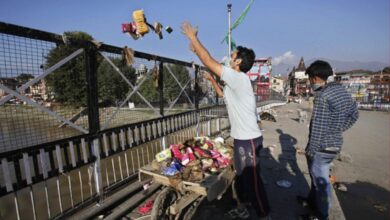Mainstream Indian Media: A Narrative Of The Broken Fourth Pillar Of Democracy That Is Broken Beyond Repair!

In the last decade, how Indian media is biased and broken needs no further shreds of evidence. As every day passes, the majority of Indian media itself presents such instances that force us to accept that Indian media today is the ‘broken fourth pillar of democracy’.
Below, we will try to understand how it concerns how Indian media attention often favours sensationalism over substantive efforts.
The pathetic situation of the Jewel of the Crown of India.
It is often said that if Kashmir is the Crown of India, then Ladakh is the Jewel of that Crown. Once known for its breathtaking landscapes and crystal clear skies, Ladakh is now struggling to gain recognition and position in the country. This region of the world’s highest passes has long been strategically important and culturally rich. However, a series of developments have occurred in recent years, dramatically altering the sociopolitical environment.
The lifting of Article 370, which conferred special status to Jammu and Kashmir, marked a watershed event for Ladakh. This move divided the region into two independent Union territories, Ladakh and Jammu and Kashmir, bringing with it celebrations, along with a slew of difficulties and obstacles.
When the government forgot to take care of this Jewel of the Crown of India, another Jewel of India, Mr Sonam Wangchuk, took the call and decided to peacefully protest so that the centre could hear their pleas and fulfil the promises that the Union Government did in 2019 after abrogating the Article 370. Following the abrogation of Article 370 on 05.08.2019, Ladakh celebrated its newfound independence from Jammu and Kashmir, but by 2024, it had turned to resentment.
Today, it is demanding the same old safeguards granted by Article 370, namely job and land rights protection. While all of this is going on, the mainstream media’s lack of interest in the problem has simply made matters worse.

Mr Wangchuk fasted for 21 days, but neither the Union government nor the mainstream media bothered to address the issues of the region, leading to such a situation that forced Mr Wangchuk to state that if India denies democratic rights to the people of Ladakh, then it could only be called a ‘Stepmother of Democracy’!
He is a person who has given so much to India by assisting in the design and construction of various passive solar mud structures in mountain regions such as Ladakh, Sikkim, and Nepal in order to implement energy-saving concepts on a larger scale. If he uses such harsh, then it showcases how they feel deceived by the Union Government. Yet the mainstream Indian media does not care about broadcasting his efforts and those of his people.

Many Ladakh students studying in regions of Jammu and Kashmir and throughout India flocked to the streets to support Sonam Wangchuk‘s hunger strike. Most of the time, Ladakh remains unnoticed. In 2020, when youth from Jammu and Kashmir were leading a protest against ill-conceived work regulations, many Ladakh students marched to the streets, demanding job reservation, the Sixth Schedule, and an independent Public Service Commission.
And if one thinks he is protesting only for the statehood of Ladakh and the rights of Ladakhi people, then wait a minute and try to understand his whole idea of fasting, which includes protecting the fragile ecosystem of Ladakh as it is one of the important parameters. However, the mainstream Indian media is so busy showcasing communal speeches that it forgets if the Jewel of the Crown of India is hurt, the entire Indian empire can be shaken. So, isn’t it the duty of mainstream Indian media to address such an important issue?
Moreover, what’s more unfortunate is that on the one hand, there is no noise or uproar by mainstream Indian media for such a real-life hero who is struggling to tackle the critical climatic conditions, and on the other hand, an influencer called Prajakta Koli won the ‘Climate Influencer Of The Year’ at NDTV Indian Of The Year awards. This is new India, where a social media star receives an award for doing nothing, but a true climate change fighter receives little media attention or no media attention from mainstream Indian media even after 21 days of fasting in minus temperatures.
Are we brave enough to admit that it is troubling that Indian media attention frequently favours sensationalism over substantive efforts? Mr Wangchuk’s committed efforts to combat climate change deserve more respect than they now receive. It is critical to promote and encourage people like him who are actively striving to protect the environment rather than focusing exclusively on social media popularity.

Ironically, this award was given by none other than the NDTV group, and this signature event of NDTV claims that it has grown to become an important platform to honour individuals and organisations dedicated to the nation’s progress. The awards have consistently celebrated India’s heroes, famous or unsung, acknowledging their extraordinary contribution to society.
However, NDTV followed only one criterion, that is, being famous, in choosing the participant for the award and deliberately ignored the ‘unsung hero’ who is actually fighting for the critical climatic conditions. Of course, why does the mainstream media show something that the Union government doesn’t want to be broadcasted, specifically on that media channel that PM’s close friend owns? Sad, but it seems like mainstream Indian media is not only biased but broken beyond repair!
And if you ask the group of intellectuals on LinkedIn about who Prajakta Koli is, most of them will say they never heard of her!! There is nothing wrong in selecting people from social media clans and we do not have anything personal with Ms Koli; however, no Doubt The Very opinionated & avoidable channel will not select the deserved!!
This perspective on the differences in acknowledgement of genuine climate change activism is both moving and necessary. It serves as a reminder that, despite the glamour of awards and media publicity, true heroes frequently work in the silence of the overlooked yet important corners. Sonam Wangchuk’s passion to protecting the Ladakh ecosystem exemplifies the level of commitment required to make a significant effect, and being the fourth pillar of democracy, it is the duty of mainstream Indian media to address such a critical issue on their channel, or otherwise, this fourth pillar will be broken beyond repair!!!




